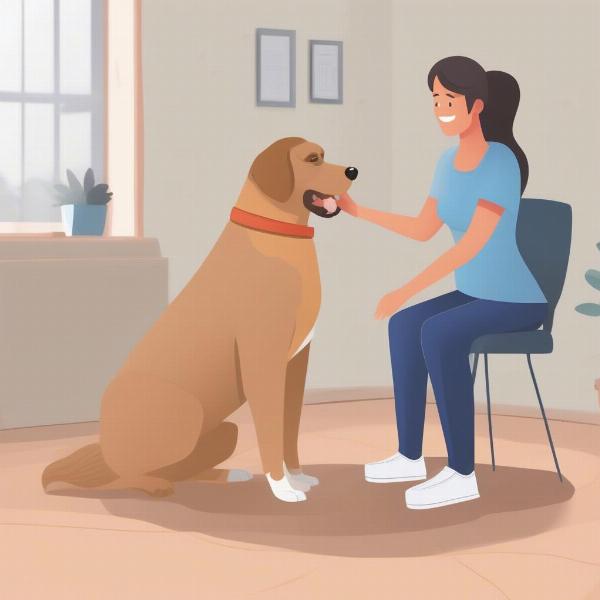The term “big dog guns” is often used colloquially to refer to large, powerful dog breeds. While this term might sound catchy, it’s important to remember that owning a large, powerful dog comes with significant responsibilities. This article will explore the implications of owning such breeds, focusing on responsible ownership, training, and understanding breed-specific needs. We’ll delve into what makes these dogs unique and how to ensure their well-being and the safety of those around them.
Choosing the Right “Big Dog Gun”: Breed Considerations
Selecting a large dog breed should be a well-informed decision. Not all “big dog guns” are created equal. Breeds like German Shepherds are known for their intelligence and trainability, making them suitable for various roles, from family companions to working dogs. Rottweilers, on the other hand, possess a protective instinct and require experienced owners who can provide consistent training and socialization. Understanding these breed-specific traits is crucial for ensuring a harmonious relationship between dog and owner. Before bringing a large dog into your home, research thoroughly. Consider factors like temperament, exercise requirements, and potential health issues.
Training and Socialization: Essential for Big Dogs
 Training a large dog
Training a large dog
Training and socialization are paramount for large, powerful breeds. Early socialization exposes puppies to various sights, sounds, and experiences, helping them develop into well-adjusted adults. Consistent training, using positive reinforcement methods, builds a strong bond between dog and owner and establishes clear communication. Basic obedience commands, such as sit, stay, and come, are essential for maintaining control and ensuring safety. Furthermore, specialized training, depending on the breed and individual dog’s temperament, can address specific behavioral needs.
Health and Care for Your “Big Dog Gun”
Large breeds often have specific health concerns, such as hip dysplasia and bloat. Regular veterinary checkups, a balanced diet, and appropriate exercise are vital for maintaining their health and well-being. how to get dog smell out of carpet Proper grooming is also essential, not only for aesthetic purposes but also for hygiene and early detection of any skin issues.
Exercise and Enrichment: Keeping Your Big Dog Happy
Large dogs require ample exercise and mental stimulation to prevent boredom and destructive behaviors. Daily walks, playtime, and engaging activities are essential for their physical and mental health. Providing puzzle toys, interactive games, and opportunities for exploration can help keep them entertained and fulfilled.
Responsible Ownership: A Must for “Big Dog Guns”
Owning a “big dog gun” is not just about having a powerful companion; it’s about understanding the responsibility that comes with it. Responsible owners prioritize their dog’s well-being, ensuring they receive proper training, socialization, exercise, and healthcare. They also understand the importance of public safety and take precautions to prevent any incidents. This includes using appropriate leashes and harnesses, securing their property, and being mindful of their dog’s behavior in public spaces. dog hunting hats
Conclusion
“Big dog guns” can be loving and loyal companions, but their size and strength require responsible and dedicated ownership. By focusing on proper training, socialization, healthcare, and understanding breed-specific needs, you can ensure a happy and fulfilling life for your large dog while also promoting safety and responsible pet ownership. top gun names for dogs
FAQ
- What are some common health issues in large dog breeds? Large breeds are prone to hip and elbow dysplasia, bloat, and certain heart conditions.
- How much exercise does a large dog need? Most large dogs require at least an hour of exercise daily, but this can vary depending on breed and individual needs.
- What is the best way to train a large dog? Positive reinforcement methods, using rewards and praise, are generally the most effective.
- Is it important to socialize a large dog? Yes, early and ongoing socialization is crucial for helping large dogs develop into well-adjusted adults.
- What are some essential supplies for a large dog? Essential supplies include a sturdy leash and collar or harness, food and water bowls, a comfortable bed, grooming tools, and toys.
- Are large dogs good with children? Some large breeds are known to be gentle with children, but proper supervision and training are always necessary.
- What should I consider before adopting a large dog? Consider factors like your living space, lifestyle, experience with dogs, and the breed’s specific needs.
ILM Dog is your trusted resource for all things dog-related. We offer expert advice on dog breeds, health, training, nutrition, grooming, and much more. Whether you’re a seasoned dog owner or just starting out, we’re here to help you provide the best possible care for your canine companion. Contact us for personalized guidance and support: Email: [email protected], Phone: +44 20-3965-8624. ILM Dog is committed to promoting responsible dog ownership and helping you build a strong, loving bond with your furry friend.